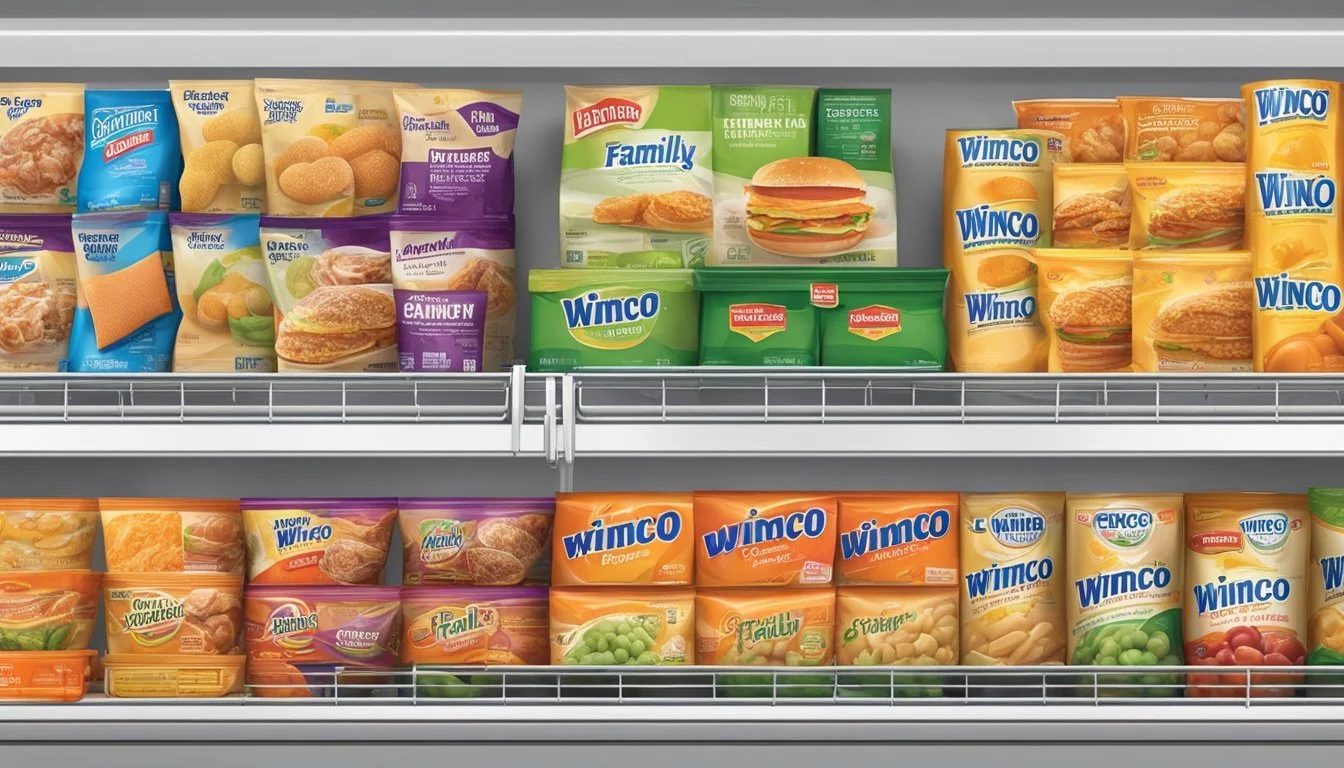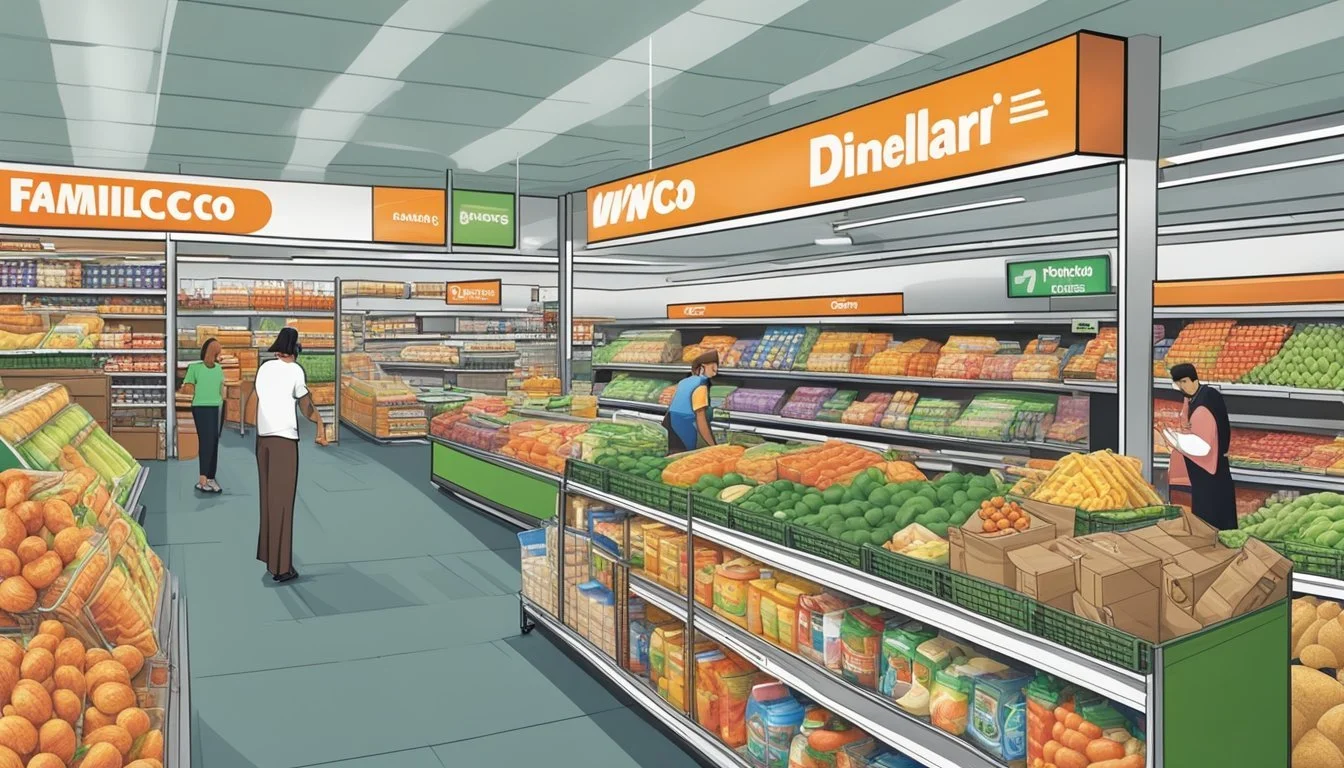Family Dollar vs WinCo Foods
A Comprehensive Comparison of Budget-Friendly Options
Family Dollar and WinCo Foods represent two distinct options for budget-conscious grocery shoppers. While both aim to provide affordable products, they cater to different consumer needs and shopping preferences.
WinCo Foods operates as a full-service supermarket, offering a wide array of fresh produce, meats, and bulk items. The employee-owned company is known for its no-frills approach and focus on keeping prices low. WinCo consistently ranks among the cheapest grocery stores in the U.S., with prices typically 12 to 30 percent below average.
Family Dollar, on the other hand, is a discount variety store that carries a limited selection of groceries alongside household goods and other merchandise. It targets shoppers looking for convenience and quick purchases, especially in areas with limited access to larger supermarkets. The store's smaller footprint and curated inventory allow it to operate in locations where full-size grocery chains may not be viable.
Overview of Family Dollar and WinCo Foods
Family Dollar and WinCo Foods are two distinct retail chains serving different segments of the grocery market. Each has its own unique history, business approach, and geographical presence.
History and Expansion
Family Dollar was founded in 1959 by Leon Levine in Charlotte, North Carolina. The company rapidly expanded, focusing on offering low-priced household goods and groceries in urban and rural areas. By 2015, Family Dollar was acquired by Dollar Tree, creating a vast network of discount stores across the United States.
WinCo Foods, originally known as Waremart, began operations in 1967 in Boise, Idaho. The company rebranded to WinCo in 1999, with the name standing for "Winning Company." WinCo has grown steadily, known for its employee ownership model and no-frills approach to keeping prices low.
Business Models and Target Markets
Family Dollar operates as a discount variety store chain. It targets budget-conscious shoppers in urban and rural areas, offering a mix of groceries, household items, and seasonal goods at low prices. The stores are typically smaller than traditional supermarkets, making them convenient for quick shopping trips.
WinCo Foods functions as a low-cost supermarket chain. It appeals to price-sensitive consumers looking for bulk purchases and a wide range of grocery items. WinCo's business model includes:
Employee ownership
24-hour operations in most locations
Bulk food sections
No acceptance of credit cards to reduce processing fees
Store Presence and Locations
Family Dollar has a widespread presence across the United States, with thousands of stores in urban, suburban, and rural areas. The chain operates in 46 states, providing easy access to discount goods for millions of Americans.
WinCo Foods has a more limited geographical footprint, primarily serving the western United States. The company operates in 10 states:
Washington
Idaho
California
Nevada
Oregon
Utah
Arizona
Texas
Oklahoma
Montana
WinCo stores are typically larger than Family Dollar locations, resembling traditional supermarkets in size and product range. The company focuses on strategic expansion, carefully selecting new store locations to maintain its low-price model and employee benefits.
Product Range and Quality
Family Dollar and WinCo Foods offer distinct product selections to cater to different consumer needs. Their offerings vary in terms of fresh items, pantry staples, and specialty products.
Fresh Produce and Meat Offerings
WinCo Foods provides a wider array of fresh produce and meat compared to Family Dollar. Their produce section features a variety of fruits and vegetables, often sourced locally when in season. WinCo's meat department offers both packaged and butcher-cut options, including beef, pork, poultry, and seafood.
Family Dollar's fresh offerings are more limited. They typically stock basic produce items like bananas, apples, and potatoes. Their meat selection usually consists of pre-packaged options and frozen varieties.
Quality can vary at both stores. WinCo generally maintains higher standards for freshness, while Family Dollar focuses on affordability.
Pantry Staples and Dry Goods
Both stores stock essential pantry items, but WinCo excels in this category. They offer an extensive bulk foods section where customers can purchase grains, nuts, spices, and cereals in custom quantities.
Family Dollar carries a range of packaged dry goods, including:
Canned vegetables and fruits
Pasta and rice
Baking essentials
Condiments and sauces
WinCo's selection is broader, often including multiple brands and sizes for each product type. They also feature a wider variety of international and specialty dry goods.
Organic and Specialty Products
WinCo Foods has made strides in expanding its organic and specialty product offerings. They stock organic produce, meats, and pantry items, catering to health-conscious consumers. Their selection includes:
Organic fruits and vegetables
Gluten-free options
Plant-based alternatives
Non-GMO products
Family Dollar's organic and specialty selections are limited. They may carry a few organic items, but their focus remains on conventional products. Specialty dietary needs are not a primary focus for Family Dollar.
WinCo also offers a broader range of specialty products, including international foods and gourmet items. Family Dollar's specialty offerings are typically limited to seasonal or promotional items.
Pricing and Value for Money
Family Dollar and WinCo Foods employ distinct strategies to offer competitive prices. Both chains aim to provide value for money, but their approaches and price points differ significantly.
Everyday Low Prices Strategy
WinCo Foods maintains consistently low prices across its product range. The company cuts costs by operating as a no-frills warehouse-style store and buying directly from suppliers. This allows WinCo to pass savings on to customers.
Family Dollar, on the other hand, focuses on smaller neighborhood stores with a mix of everyday essentials and discount items. Their prices are generally low, but not always the lowest in the market.
Comparing Costs with Other Retailers
WinCo Foods often beats competitors like Walmart and Costco on price. A typical shopping trip at WinCo can save customers 15-20% compared to traditional supermarkets.
Family Dollar's prices are competitive with dollar stores and small format discounters. However, they may be higher than bulk retailers or large supercenters for some items.
Sales and Discounts Frequency
Family Dollar regularly offers weekly specials and coupon deals. These promotions can lead to significant savings on select items, especially household goods and packaged foods.
WinCo Foods rarely runs sales or offers coupons. Instead, they maintain low prices year-round. This approach appeals to shoppers who prefer consistent pricing without the need to track promotions.
Both stores use loss leaders to attract customers. WinCo often prices staples like milk and eggs below cost, while Family Dollar may offer deep discounts on seasonal items or closeouts.
Shopping Experience and Convenience
Family Dollar and WinCo Foods offer distinct shopping experiences tailored to different consumer needs. Each store has its own approach to layout, checkout processes, and customer service.
Store Layout and Design
Family Dollar stores typically have a compact layout, making them easy to navigate quickly. Aisles are arranged with everyday essentials and household items within reach. The small footprint caters to shoppers looking for a quick in-and-out experience.
WinCo Foods, in contrast, features larger warehouse-style stores. Wide aisles accommodate bulk purchases and a broader product selection. The open layout allows families to browse comfortably, but it may require more time to locate specific items.
Both stores use clear signage to help customers find products efficiently. Family Dollar's smaller size means less walking, while WinCo's spacious design reduces crowding during peak hours.
Checkout and Payment Options
Family Dollar provides a streamlined checkout process with multiple registers to handle customer flow. They accept various payment methods, including cash, credit cards, and EBT.
WinCo Foods is known for its unique approach to checkout. Customers bag their own groceries, which can speed up the process for experienced shoppers. WinCo accepts debit cards and cash but does not take credit cards, a policy that helps keep prices low.
Both stores offer self-checkout options in many locations, catering to customers who prefer a quick, autonomous experience. Family Dollar's compact size often means shorter lines, while WinCo's multiple checkout lanes help manage larger crowds.
Customer Service and Support
Family Dollar emphasizes quick, friendly service. Staff are trained to assist customers in finding products quickly. The smaller store size allows employees to be more readily available throughout the shopping area.
WinCo Foods takes pride in its employee-owned model, which can translate to more invested and knowledgeable staff. Customer service desks are available for returns, exchanges, and inquiries. The larger store format may mean staff are spread out, but dedicated departments like deli and bakery have specialized personnel.
Both chains prioritize cleanliness and organization to enhance the shopping experience. Family Dollar focuses on efficiency, while WinCo aims to provide a comprehensive grocery shopping environment for families and bulk buyers.
Grocery Shopping on a Budget
Savvy shoppers can find significant savings at both Family Dollar and WinCo Foods. These stores offer various ways to stretch your grocery budget through smart shopping strategies and store-specific programs.
Money-Saving Tips at Each Store
Family Dollar provides budget-friendly options for everyday essentials. Look for their "$1 WOW" deals on select items throughout the store. WinCo Foods offers bulk bins where customers can purchase exactly the amount they need, reducing waste and costs.
At Family Dollar, check end-cap displays for clearance items and markdowns. WinCo Foods is known for its low prices on produce and store-brand products. Both stores frequently rotate sales, so shoppers should review weekly ads before their trip.
Compare unit prices rather than total costs to find the best value. This strategy works especially well at WinCo Foods, where bulk options often provide significant savings per ounce or pound.
Loyalty Programs and Coupons
Family Dollar's Smart Coupons program allows shoppers to load digital coupons directly to their account. These coupons can be applied at checkout for instant savings. The store also accepts manufacturer coupons, multiplying potential discounts.
WinCo Foods does not offer a traditional loyalty program but compensates with consistently low prices. They do, however, accept manufacturer coupons, which can lead to substantial savings when combined with their already competitive pricing.
Both stores occasionally provide printable coupons on their websites. Savvy shoppers can stack these with in-store promotions for maximum savings. It's worth checking both stores' websites and mobile apps regularly for the latest offers.
Buying in Bulk and Meal Planning
WinCo Foods excels in bulk shopping options. Their extensive bulk section allows customers to purchase exactly the quantity needed, from spices to grains. This approach reduces packaging costs and allows for precise portion control.
Family Dollar offers multi-packs of popular items, which can provide savings for frequently used products. While their selection may be more limited, bulk buying opportunities still exist for non-perishable goods.
Meal planning is crucial for budget shopping at both stores. By planning weekly menus around sale items and in-season produce, shoppers can significantly reduce their grocery bills. This strategy works particularly well at WinCo Foods, where the diverse bulk section supports varied meal plans.
Creating a shopping list based on meal plans helps avoid impulse purchases. Both stores offer basic ingredients at competitive prices, making it easier to stick to a budget while preparing home-cooked meals.
Extra Services and Offerings
Family Dollar and WinCo Foods offer distinct additional services beyond basic grocery shopping. These extras can significantly impact the overall shopping experience and value for customers.
Grocery Delivery Options
WinCo Foods partners with Instacart to provide delivery services in select areas. Customers can order groceries online and have them delivered to their doorstep, often within a few hours. This convenience comes with additional fees.
Family Dollar does not offer a dedicated grocery delivery service. However, some locations participate in third-party delivery platforms like DoorDash or Uber Eats for a limited selection of items.
Neither chain provides their own in-house delivery service, which may be a drawback for customers seeking consistent delivery options across all store locations.
Store Brands vs. National Brands
WinCo Foods offers a wide range of store-brand products across various categories. These items are typically priced lower than national brands, providing budget-friendly alternatives without sacrificing quality.
Family Dollar carries a mix of store brands and national brands. Their store brands, such as Family Gourmet and Family Chef, cover many product categories at competitive prices.
Both chains stock popular national brands, giving customers choices between familiar products and more affordable store-brand options.
Additional In-Store Services
WinCo Foods provides bulk food sections in many stores, allowing customers to purchase exactly the quantity they need. Some locations offer coin-counting machines and money order services.
Family Dollar focuses on basic retail services. Many stores have Western Union money transfer services and sell prepaid phone cards.
Neither chain typically offers extensive additional services like pharmacies or banking facilities found in larger supermarket chains.
Both stores accept SNAP/EBT benefits, making them accessible to customers using government assistance programs for grocery purchases.
Consumer Perceptions and Brand Reputation
Family Dollar and WinCo Foods have distinct reputations among shoppers. Their brand images are shaped by customer experiences, survey data, and expert analyses.
Customer Satisfaction Surveys
Recent surveys reveal contrasting customer perceptions of Family Dollar and WinCo Foods. Family Dollar scores lower on overall satisfaction, with shoppers citing concerns about product quality and store cleanliness.
WinCo Foods, however, consistently ranks higher in customer satisfaction. Shoppers appreciate its low prices and bulk buying options. A Consumerpedia poll found that 85% of WinCo customers would recommend the store to friends and family.
Family Dollar faces challenges in improving its image, while WinCo enjoys a more positive reputation among its customer base.
Online Reviews and Ratings
Digital platforms provide valuable insights into shopper sentiments. Family Dollar's online reviews are mixed, with an average rating of 3.2 out of 5 stars across major review sites.
Common complaints include long checkout lines and limited product selection. Positive reviews often mention convenience and affordability.
WinCo Foods fares better online, averaging 4.1 out of 5 stars. Shoppers praise the store's competitive pricing and fresh produce. Negative feedback typically focuses on crowded aisles during peak hours.
These online ratings significantly influence potential customers' perceptions and shopping decisions.
Expert Opinions and Testimonials
Industry experts and consumer advocates have weighed in on both chains. A popular grocery shopping podcast recently featured an episode comparing Family Dollar and WinCo Foods.
The hosts highlighted WinCo's employee ownership model as a key differentiator. They noted that this structure often leads to better customer service and store management.
Consumer Reports researchers conducted a comprehensive analysis of both stores. They found that WinCo Foods offered better value for money on most staple items.
Family Dollar received praise for its widespread accessibility, particularly in urban and rural areas with limited grocery options.
Future Outlook and Industry Trends
The grocery industry is undergoing rapid transformation. Technological advancements, changing consumer behaviors, and environmental concerns are reshaping how people shop for food and household goods.
Technological Advances in Retail
Artificial intelligence and automation are revolutionizing grocery stores. Self-checkout kiosks and cashierless stores are becoming more common. Smart shelves can track inventory in real-time, reducing out-of-stock issues. Mobile apps allow customers to create shopping lists, find product locations, and access personalized deals.
Robotics are improving efficiency in warehouses and distribution centers. Drones may soon deliver groceries in some areas. Virtual and augmented reality could enhance the in-store experience, allowing customers to view product information or recipe ideas.
Data analytics help retailers optimize pricing, predict demand, and customize promotions. This leads to more efficient operations and a better shopping experience.
The Shift Toward Online Grocery Shopping
E-commerce is growing rapidly in the grocery sector. Many consumers now prefer the convenience of ordering groceries online for home delivery or curbside pickup. This trend accelerated during the COVID-19 pandemic and continues to gain momentum.
Retailers are investing heavily in their digital platforms and fulfillment capabilities. Some are building automated micro-fulfillment centers to efficiently process online orders. Others are partnering with third-party delivery services to expand their reach.
Subscription-based models for recurring grocery deliveries are becoming popular. Voice-activated ordering through smart home devices is also on the rise.
Environmental and Ethical Considerations
Sustainability is increasingly important to consumers and retailers alike. Grocers are adopting more eco-friendly practices, such as:
Reducing plastic packaging
Offering more plant-based and local products
Implementing energy-efficient store designs
Minimizing food waste through improved inventory management
Ethical sourcing is gaining attention. Customers want transparency about where their food comes from and how it's produced. This drives demand for fair trade, organic, and humanely raised products.
Some stores are introducing bulk shopping options to reduce packaging waste. Others are experimenting with reusable container programs for certain items.








